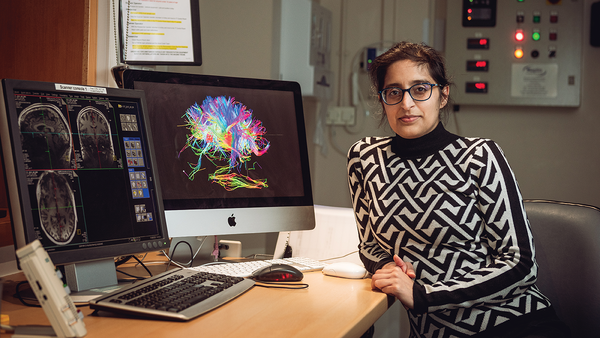You are viewing 1 of your 3 articles before login/registration is required
Making Connections
Associations between dementia and visual impairment
Although it may seem as if dementia and visual impairment (VI) operate independently, research has highlighted an array of interrelated effects. From the challenges of processing visual information with dementia to the increased susceptibility to eye disease in individuals experiencing cognitive decline, the links between dementia and VI are both intricate and bidirectional.
Although prior work has suggested a link between sensory loss and dementia, there has been a lack of evidence at the population level, prompting researchers to take a closer look. To learn more, we speak with Joshua Ehrlich, Assistant Professor of Ophthalmology and Visual Sciences at the University of Michigan, who has been investigating the association between objectively measured VI and dementia among older US adults (1).
Can you outline how you conducted the research?
We used data from a large, nationally representative study, the National Health and Aging Trends Study (NHATS). In NHATS, trained examiners administer both vision and cognitive tests to participants in their homes. Because of the way that NHATS participants are sampled, the data can be used to make estimates about the older (in this case age 71 plus) US population at large.
We used the vision data – three different tests: near vision, distance vision, and contrast sensitivity – and cognitive test data to analyze the association between each type of vision test and dementia.
What were the most significant findings?
Each type of vision impairment was associated with an increase in the prevalence of dementia, even when accounting for the demographics (e.g., age, sex, education) and health characteristics (e.g., smoking status, diabetes) of respondents. The increase in prevalence of dementia among those with near vision impairment, moderate, or worse distance vision impairment, and contrast sensitivity impairment was 40 percent, 72 percent, and 31 percent, respectively. Those with more than one type of vision impairment had a higher prevalence of dementia compared to those with just one vision impairment.
We did not anticipate the stepwise increase in the prevalence of dementia that occurred based on the number of visual functions that were impaired.
What are the potential clinical and public health implications of your findings?
An estimated 80-90 percent of vision impairment is preventable or has simply yet to be addressed. While many risk factors for dementia are difficult to address, often vision can be improved with cost-effective interventions like eyeglasses and cataract surgery. Thus, healthy vision may be a lever to promote not just good eyesight, but also general health, wellbeing, and optimal aging.
What are the next steps for the research?
We will use longitudinal data to investigate how these associations play out over a longer time horizon, as well as how changes in vision influence changes in cognition. There is also a great need in the field for clinical trials to test whether improving vision has a long term impact on cognitive health.
Anything else you would like to share?
Declining vision is not a normal part of aging. When older adults – or anyone – notes changes in their vision, they should visit an eye doctor, as many of the issues affecting the eyes can be fixed, or at least treated so that they don’t get worse.
This article first appeared in The Ophthalmologist.
Reference
- O J. Killeen et al., “Objectively Measured Visual Impairment and Dementia Prevalence in Older Adults in the US,” JAMA Ophthalmol, [Online ahead of print] (2023). PMID: 37440238.
The New Optometrist Newsletter
Permission Statement
By opting-in, you agree to receive email communications from The New Optometrist. You will stay up-to-date with optometry content, news, events and sponsors information.
You can view our privacy policy here
Most Popular
Sign up to The New Optometrist Updates
Permission Statement
By opting-in, you agree to receive email communications from The New Optometrist. You will stay up-to-date with optometry content, news, events and sponsors information.
You can view our privacy policy here
Sign up to The New Optometrist Updates
Permission Statement
By opting-in, you agree to receive email communications from The New Optometrist. You will stay up-to-date with optometry content, news, events and sponsors information.
You can view our privacy policy here









